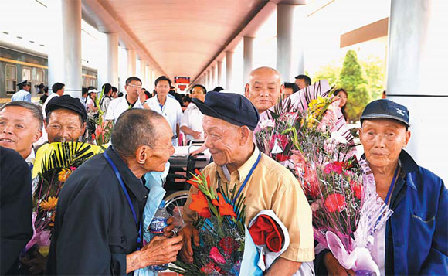
Elderly people from Sichuan province are welcomed on their arrival at Yinchuan railway station, Ningxia Hui autonomous region, on Saturday. A total of 18 orphans and 65 elderly people were transferred to homes in the province.
Zhan Yingmei, 71, and her 73-year-old husband Yi Jianyong used to lead a tranquil life in the mountainous village of Bayi in Qingchuan county, Sichuan province.
But all that changed on May 12, when the earthquake destroyed their house, farmland and killed Yi.
Zhan was really worried, as she has no children and did not know how she would make a living.
However, thanks to the Sichuan civil affairs department, Zhan was able to breathe a sigh of relief last week when she was given a place at the Dafeng Old People's Home in the Xindu district of Chengdu, the provincial capital.
"The home will provide me with room and board for the rest of my life," she told China Daily.
Chen Kefu, deputy chief of the civil affairs department, said the earthquake left 2,500 senior citizens without their spouses and made 1,400 children orphans.
Tens of thousands of people have called asking to adopt orphans, he said.
"But almost no individuals or institutions have shown any interest in adopting bereaved old folk," Chen said.
On May 28, the provincial civil affairs bureau asked officials from 21 city- and prefecture-level departments to do their best to support Sichuan's old people and orphans, as well as the 1,600 handicapped citizens bereaved by the earthquake.
"Now, all of them have been given places at old people's homes or orphanages," he said.
"They also get a monthly allowance of 600 yuan ($85), more than other quake victims, who get 10 yuan and 500 g of grain a day."
The Ministry of Civil Affairs and the Sichuan provincial department of civil affairs have vowed to do their utmost to support all the bereaved elderly, orphans and the handicapped, he said.
For several days after the quake hit, the telephones at the civil affairs department were jammed with calls by people looking to adopt orphans, Chen said.
The problem was identifying exactly how many orphans there were, he said.
"Only a child who has lost both his father and mother can be called an orphan. Some children's parents are still missing," Chen said.
The process of identifying orphans was further slowed down by the fact that most of the department's employees were also involved in handling donations to the relief effort, he said.
The Ministry of Civil Affairs and the Sichuan provincial government have formulated a regulation pertaining to the adoption of orphans, he said.
Orphans' relatives will be given priority when it comes to adoption, he said, while those who want to adopt a child aged over 10, must seek permission from his or her remaining family.
Preference will also be given to those who live in the same town or city as the child, he said.
Foreigners can apply to adopt orphans, but they must submit their applications to the civil affairs bureau in the city in which the child has his or her permanent residence.
They must also provide documentary evidence of their personal circumstances, including income and health.
"Preference will be given to those with high incomes and a good education," he said.
(China Daily June 5, 2008)